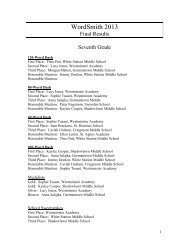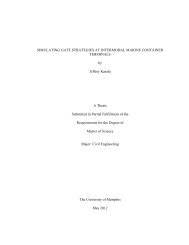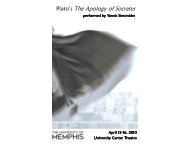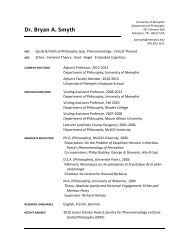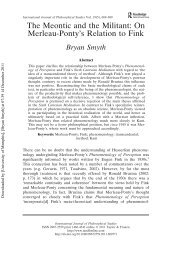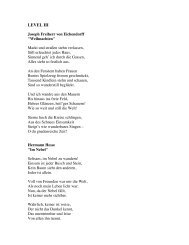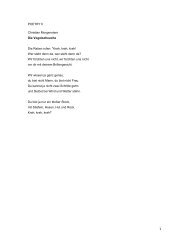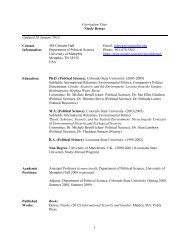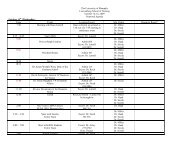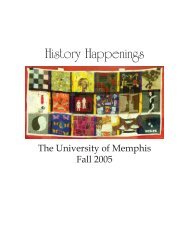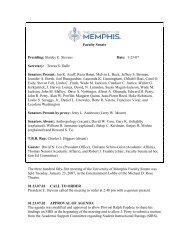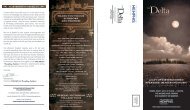Health, Culture, and Environmental Justice - University of Memphis
Health, Culture, and Environmental Justice - University of Memphis
Health, Culture, and Environmental Justice - University of Memphis
You also want an ePaper? Increase the reach of your titles
YUMPU automatically turns print PDFs into web optimized ePapers that Google loves.
Anthropology 4/6510: <strong>Health</strong>, <strong>Culture</strong>, <strong>and</strong> <strong>Environmental</strong> <strong>Justice</strong><br />
Fall 2013<br />
Manning Hall 320, W 5:30-8:30<br />
Instructor: Dr. Kathryn Hicks<br />
Office: Manning Hall 300A<br />
Email: kahicks2@memphis.edu<br />
Office hours: Monday 11:00 -2:00 pm, <strong>and</strong> by<br />
appointment.<br />
Course Description: Creation <strong>of</strong> health inequalities through socio-cultural forces that shape<br />
differential exposure to environmental hazards; basic concepts in cultural ecology <strong>and</strong><br />
environmental health; anthropological approaches to underst<strong>and</strong>ing human biology; race <strong>and</strong><br />
class as influences <strong>of</strong> disease risk in U. S. <strong>and</strong> global south; grassroots <strong>and</strong> community-based<br />
research efforts to combat environmental health inequalities.<br />
Course Objectives:<br />
1. To underst<strong>and</strong> the relationship between discrimination based on race, class <strong>and</strong><br />
environmental inequality, <strong>and</strong> health disparities.<br />
2. To examine the history <strong>of</strong> the environmental justice movement <strong>and</strong> the strategies<br />
employed by activists.<br />
3. To examine EJ struggles in <strong>Memphis</strong> by hearing from local activists.<br />
4. To engage in basic research on EJ-related issues.<br />
Required Readings<br />
Auyero, Javier <strong>and</strong> Alej<strong>and</strong>ra Swistun. 2009. Flammable: <strong>Environmental</strong> Suffering in an<br />
Argentine Shantytown. Oxford: Oxford <strong>University</strong> Press.<br />
Cole, Luke L. <strong>and</strong> Sheila Foster. From the Ground up: <strong>Environmental</strong> Racism <strong>and</strong> the Rise <strong>of</strong> the<br />
<strong>Environmental</strong> <strong>Justice</strong> Movement. New York: NYU Press.<br />
Colten, Craig E. 2006. An Unnatural Metropolis: Wresting New Orleans from Nature. New<br />
Orleans: LSU Press.<br />
Corburn, Jason. 2005. Street Science: Community Knowledge <strong>and</strong> <strong>Environmental</strong> <strong>Health</strong> <strong>Justice</strong>.<br />
Cambridge: The MIT Press.<br />
A few additional readings will be posted on ecourseware.<br />
Assignments:<br />
Attendance <strong>and</strong> participation (20%): In order to get full marks you should attend regularly, <strong>and</strong><br />
actively participate in class discussions <strong>and</strong> activities. Most importantly, this involves doing the<br />
weekly readings in advance so that everyone benefits from class discussion. Undergraduate<br />
students will be required to complete 2 hours <strong>of</strong> service-learning to earn full participation<br />
points.
Reading assignments (30%): In advance <strong>of</strong> each weekly reading assignment I will post questions<br />
designed to help you pick out the important points <strong>and</strong> critically evaluate content.<br />
Undergraduates should answer two questions in around 300 words, <strong>and</strong> graduates <strong>and</strong> honors<br />
students three questions. Some <strong>of</strong> the questions will be based on underst<strong>and</strong>ing the material,<br />
<strong>and</strong> others will require you to think about the readings <strong>and</strong> come up with your own ideas.<br />
These questions will serve as a basis for class discussion.<br />
I do not expect you to look for specific quotes or statements from the readings, but your<br />
answers should be based directly on what you have read. You can use some quotes to help<br />
support your points, but most <strong>of</strong> your answer should be in your own words. In addition, you are<br />
free to develop your own ideas <strong>and</strong> opinions, but you must be able to support your opinions<br />
with information from readings or lecture material. For example, if you think an author was<br />
particularly effective or ineffective at making their argument, be prepared to defend this point<br />
using specific examples.<br />
The questions will be posted at least one week in advance, <strong>and</strong> you should submit your typewritten<br />
answers to turnitin.com no later than 5:30 pm Wednesday afternoon. This is also your<br />
opportunity to submit additional questions whether for discussion or clarification. We will have<br />
a total <strong>of</strong> 12 weeks <strong>of</strong> reading, <strong>and</strong> each student will be responsible to submit answers for 8<br />
weeks <strong>of</strong> your choice. You should still do the readings for the other weeks, <strong>and</strong> be prepared to<br />
discuss them. These assignments will be graded out <strong>of</strong> 10 points, <strong>and</strong> averaged to get your<br />
percent score. Just bear in mind that you can buy some time for busier weeks by starting early.<br />
Current events presentation (10%): Each student will sign up to give a brief 10 minute<br />
presentation during one class session on a current event covered by the popular media. You<br />
may work on your own, or in a group. In the week leading up to your presentation you should<br />
pay attention to various news <strong>and</strong> popular media sites on current events related to<br />
environmental justice. You will bring the class up to speed on the issue, <strong>and</strong> lead a short<br />
discussion on how it relates to course content. You might focus on news stories about policy<br />
debates, environmental disasters, occupational health <strong>and</strong> safety, environmental justice<br />
organizing or anything else you think is important. You may even choose to discuss a<br />
commercial or advertising campaign. For example, you might discuss recent news reports on<br />
the ongoing fallout from the Fukushima nuclear disaster in Japan, or BP commercials about the<br />
Gulf Coast Recovery. You should give us a sense <strong>of</strong> the history <strong>of</strong> the event; the players<br />
involved etc. <strong>and</strong> pose one or two critical discussion questions for the class. I will ask group<br />
members to fill out a self <strong>and</strong> peer-evaluation in order to determine whether group members<br />
contributed equally<br />
Position Papers (40 %): Students will write a short, persuasive essay on a specified topic <strong>and</strong><br />
draw on course materials—readings, films <strong>and</strong> lectures—to support their position. I will give<br />
you the topic at least one week in advance. Undergraduate students will be required to write a<br />
5-6 page paper, <strong>and</strong> graduate students 10-12. I will provide more information on these<br />
assignments in the second week <strong>of</strong> class.
Service-Learning Option<br />
Undergraduate students can earn up to 3% in bonus points for 2 additional hours <strong>of</strong> work<br />
assisting with the South <strong>Memphis</strong> Farmers Market or Food Policy Council projects, <strong>and</strong> writing a<br />
2-page reflective paper about your experience.<br />
Honors Students<br />
Students will complete six research hours <strong>and</strong> write a 10-page reflective paper about your<br />
experience, drawing on course readings <strong>and</strong> external sources. Additional instructions will be<br />
provided.<br />
Graduate Students<br />
Research Participation:<br />
Students will conduct research associated with one or both <strong>of</strong> two projects. One is an<br />
assessment <strong>of</strong> corner stores throughout <strong>Memphis</strong> <strong>and</strong> Shelby County for the Food Policy<br />
Council, <strong>and</strong> the other is an Evaluation <strong>of</strong> the South <strong>Memphis</strong> Farmers Market (SMFM),<br />
implemented in 2010 as part <strong>of</strong> the participatory South <strong>Memphis</strong> Revitalization Action Plan.<br />
Both <strong>of</strong> these projects address issues <strong>of</strong> food justice. Students will begin by doing independent<br />
research on some aspect <strong>of</strong> food policy or food justice, <strong>and</strong> creating an annotated bibliography<br />
to share with the rest <strong>of</strong> the class. I will ask each <strong>of</strong> you to share some <strong>of</strong> the highlights <strong>of</strong> your<br />
research in a small-group discussion. Students will then conduct 12 hours <strong>of</strong> research on one <strong>of</strong><br />
the projects, either individually or in pairs or small groups. Students may choose to conduct<br />
several corner store assessments, help with data collection at the SMFM (conducting<br />
interviews, interactive mapping, shopper counts etc.) or propose your own research to<br />
compliment one or both <strong>of</strong> these projects. A goal <strong>of</strong> the SMFM project is to better underst<strong>and</strong><br />
the food environment <strong>of</strong> South <strong>Memphis</strong>, <strong>and</strong> lived experience <strong>of</strong> residents as they negotiate it.<br />
Options include using the Corner Store instrument to conduct an assessment <strong>of</strong> all the corner<br />
stores in a defined area <strong>of</strong> South <strong>Memphis</strong>, conducting ethnographic interviews or observations<br />
at local grocery stores or conducting historical research on the food system in <strong>Memphis</strong>, or the<br />
retail history <strong>of</strong> South <strong>Memphis</strong>. Other proposals are welcome. We will discuss this in detail<br />
during a subsequent class.<br />
Annotated Bibliography 10%: You will collect <strong>and</strong> read at least 4 scholarly articles related to<br />
food systems, food policy or food justice, <strong>and</strong> relevant to the two class projects. You should<br />
write a paragraph-long explanation <strong>of</strong> each paper, including what you think are some <strong>of</strong> the<br />
most important conclusions. This should not be a rewording <strong>of</strong> the abstract, but should reflect<br />
your own underst<strong>and</strong>ing <strong>and</strong> assessment <strong>of</strong> the paper, <strong>and</strong> its contribution to the literature.<br />
Each <strong>of</strong> you will discuss briefly what you think are some <strong>of</strong> most important general conclusions<br />
during class time. These bibliographies will be shared, to provide a list <strong>of</strong> potential sources for<br />
the final paper.<br />
Final Paper 20%: Each student will draw on course readings <strong>and</strong> scholarly papers to reflect on<br />
their research experience. Your paper may take the form <strong>of</strong> a scholarly publication with<br />
background, methods, analysis <strong>and</strong> discussion sections. Alternatively, your paper may involve
more literature review <strong>and</strong> reflection on your experience <strong>and</strong> observations. Students should<br />
end with a discussion <strong>of</strong> important areas for future research. I will distribute detailed<br />
instructions during a subsequent class.<br />
Graduate Breakdown<br />
Attendance <strong>and</strong> Participation: 15%<br />
Reading Assignments: 20%<br />
Position Papers: 30%<br />
Annotated Bibliography: 10%<br />
Research Participation <strong>and</strong> Final Paper: 25%<br />
Current Events Presentation: 5%<br />
Course Policies:<br />
1. I encourage you to come see me during <strong>of</strong>fice hours whenever you have questions<br />
about course material. I’m more than happy to talk through concepts or class policies<br />
with you, but I rely on you to seek me out.<br />
2. This class will involve considerable small <strong>and</strong> large group discussion. Please be respectful<br />
<strong>of</strong> other students when making your points, <strong>and</strong> make sure that you refer to course<br />
readings <strong>and</strong> lecture to support your arguments.<br />
3. I will not accept late exams <strong>and</strong> papers without a documented reason, or unless you<br />
come <strong>and</strong> speak with me in advance <strong>of</strong> the assignment. Late reading assignments will be<br />
docked 10% for every week past the deadline, starting the day after the due date.<br />
4. Cheating or other academic misconduct will result automatically in failure in the course<br />
<strong>and</strong> notification <strong>of</strong> the Office <strong>of</strong> Student Judicial <strong>and</strong> Ethical Affairs. I encourage you to<br />
discuss the course material with other students, whether in-class or in study groups.<br />
Talking with others about the material helps you learn it better <strong>and</strong> come up with new<br />
ideas. When it comes to written assignments <strong>and</strong> exams, however, you must complete<br />
the work on your own, without collaboration with others, <strong>and</strong> without copying material<br />
from other students or published sources. Please note that letting others copy from you<br />
is also academic misconduct.<br />
5. Each student needs to sign up for an account with turnitin.com, as all assignments will<br />
be submitted electronically to the turnitin drop box for this class. This is also where you<br />
will receive electronic comments on your assignments. Please use the information<br />
below to start your account.<br />
Class: <strong>Health</strong> <strong>Culture</strong> <strong>and</strong> <strong>Environmental</strong> <strong>Justice</strong><br />
Password: HCEJ
6. Please be respectful <strong>of</strong> other students <strong>and</strong> your pr<strong>of</strong>essor by listening while others are<br />
talking, keeping your cell-phone stowed until class breaks, <strong>and</strong> coming in quietly if you<br />
are late for class. The only purpose <strong>of</strong> these policies is to ensure that everyone who<br />
wants to listen <strong>and</strong> participate can do so without distraction.<br />
Week Dates Topic Reading <strong>and</strong> Discussion<br />
1 Aug 28 Introduction Welcome to ANTH 4510<br />
2 Sept 4 Historical Development<br />
<strong>of</strong> <strong>Environmental</strong><br />
Inequality <strong>and</strong><br />
Regulation<br />
Guest Speaker on<br />
Corner Store Survey:<br />
Christian Mann<br />
An Unnatural Metropolis 1-76<br />
3 Sept 11 <strong>Environmental</strong> <strong>Justice</strong>;<br />
<strong>Memphis</strong><br />
Toxic Tour with Rita<br />
Harris <strong>of</strong> the Sierra Club<br />
Board bus at 5:30<br />
Grad <strong>and</strong> Honors Students:<br />
Licensing for Lettuce: A Guide to the Model<br />
Licensing Ordinance For <strong>Health</strong>y Food Retailers<br />
From the Ground Up 1-53<br />
Braud et al. 2011. Residential Proximity to Toxic<br />
Release Sites <strong>and</strong> the Implications for Low Birth<br />
Weight <strong>and</strong> Pre-term Delivery. Journal <strong>of</strong><br />
<strong>Environmental</strong> <strong>Health</strong>. 73(6).<br />
Jones et al. 2010. Metal Exposures in an Inner-<br />
City Neonatal Population. Environment<br />
International. 36.<br />
4 Sept 18 <strong>Environmental</strong> History<br />
Continued<br />
5 Sept 25 History <strong>and</strong> Logic <strong>of</strong><br />
<strong>Environmental</strong> <strong>Justice</strong><br />
Movement;<br />
<strong>Environmental</strong><br />
Inequality<br />
6 Oct 2 Principles <strong>of</strong><br />
<strong>Environmental</strong> Public<br />
Grad <strong>and</strong> Honors Students:<br />
Hicks <strong>and</strong> Lambert-Pennington. 2013. An<br />
Evaluation <strong>of</strong> the South <strong>Memphis</strong> Farmers<br />
Market.<br />
An Unnatural Metropolis 77-185<br />
Current events presentations start<br />
Graduate <strong>and</strong> Honors Annotated Bibliography<br />
Due<br />
From the Ground up 54-165<br />
Graduate <strong>and</strong> Honors Research Proposal Due<br />
Street Science 1-78
<strong>Health</strong> Risk<br />
Assessment;<br />
Community-led<br />
Epidemiology<br />
7 Oct 9 Mapping <strong>and</strong> Spatial<br />
Analysis<br />
8 Oct 16 Community-led<br />
Epidemiology<br />
Continued<br />
9 Oct 23 Genes, Development<br />
<strong>and</strong> <strong>Environmental</strong><br />
<strong>Health</strong><br />
Street Science 79-144<br />
Mohai <strong>and</strong> Saha. Racial Inequality in the<br />
Distribution <strong>of</strong> Hazardous Waste: A National-<br />
Level Reassessment. Social Problems.<br />
First Position Paper Due<br />
Street Science 145-218<br />
Di Chiro. Producing “Roundup Ready”<br />
Communities? Human Genome Research <strong>and</strong><br />
<strong>Environmental</strong> <strong>Justice</strong> Policy, in New<br />
Perspectives on <strong>Environmental</strong> <strong>Justice</strong>: Gender,<br />
Sexuality, <strong>and</strong> Activism.<br />
10 Oct 30 International EJ Issues;<br />
Social Construction <strong>of</strong><br />
Toxic Uncertainty<br />
11 Nov 6 Continued Flammable 81-160<br />
12 Nov 13 Global Warming <strong>and</strong><br />
Climate <strong>Justice</strong><br />
Ünüvar <strong>and</strong> Büyükgebiz. 2012. Fetal <strong>and</strong><br />
Neonatal Endocrine Disruptors. J Clin Res Pediatr<br />
Endocrinol. 4(2).<br />
Heindel <strong>and</strong> Von Saal. 2009. Role <strong>of</strong> Nutrition<br />
<strong>and</strong> <strong>Environmental</strong> Endocrine Disrupting<br />
Chemicals During the Perinatal Period on the<br />
Aetiology <strong>of</strong> Obesity. 304(1-2).<br />
Flammable 1-80<br />
Athanasiou <strong>and</strong> Baer. 2002. Dead Heat: Global<br />
<strong>Justice</strong> <strong>and</strong> Global Warming. Chapters 1-4.<br />
13 Nov 20 Global Warming <strong>and</strong> Dead Heat chapters 5-9<br />
Policy<br />
14 Nov 27 Continued No class: work on reading questions <strong>and</strong> projects<br />
15 Dec 4 Conclusions Barlow. Blue Covenant: The Global Water Crisis<br />
<strong>and</strong> the Coming Battle for the Right to Water.<br />
1-101.<br />
Final Position Paper Due.
Finals<br />
Week<br />
Graduate <strong>and</strong> Honors Papers Due.



